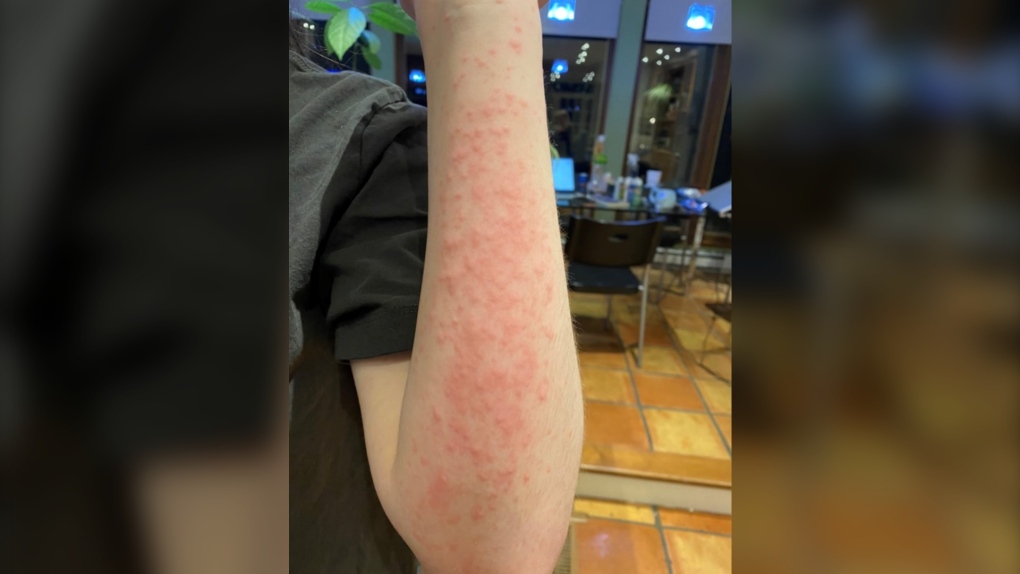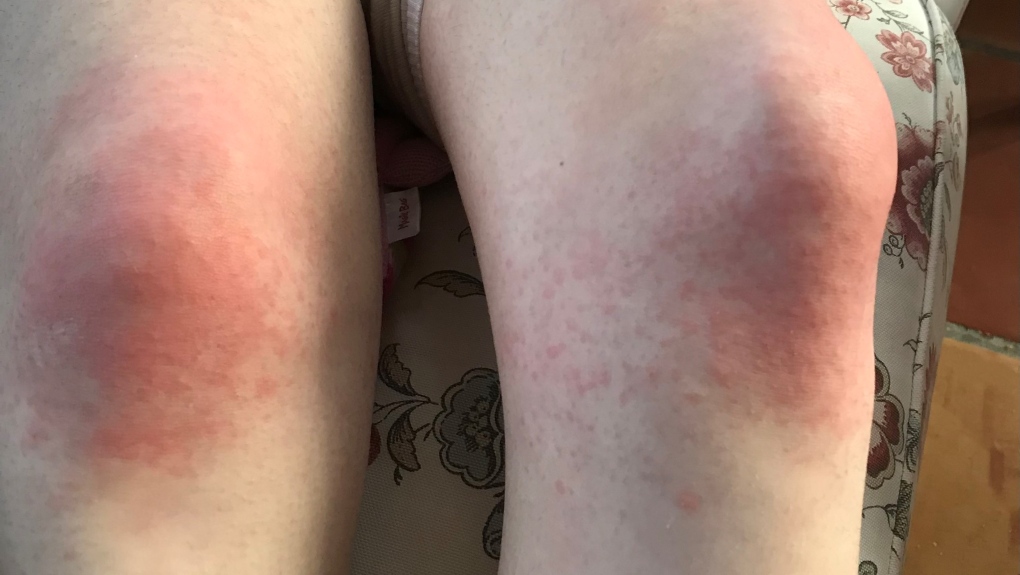Think you hate the cold? Meet the Montreal girl who's 'allergic' to it
Eryn Margolese’s routine before going outside this time of year would sound familiar to a lot of Montrealers.
“Depending on how cold it is, I'll wear two pairs of pants,” says the 15-year-old. “And I'll always wear, like, long sleeves, jackets, hat, gloves, scarves—everything.”
Nobody likes to be cold. But for Margolese, it’s not quite the same thing.
In 2020, she started getting a strange rash at odd times: raised, itchy red bumps on her skin that could take hours to go away. She tried to ignore it.
“I didn’t really know what was happening,” she said. “I just had some rash, and I was like ‘OK, that’s weird,’ and then it kept happening and I had no idea what it was.”
Finally, she went to “a bunch of doctors” and they tried to help. Maybe it was a kind of soap or laundry detergent she was reacting to, they theorized. But she hadn’t been using any new products.

Finally, an allergist at the Montreal Children’s Hospital had a new idea.
Dr. Moshe Ben-Shoshan took an ice cube and put it on Margolese’s arm. The rash quickly appeared, and he knew exactly what the problem was.
In such “ice cube tests,” he explained, “we wait five minutes and then we observe the development of hives aftewards.”
Margolese had come with a story he recognized, he said—“a classic story of going swimming or going outside in cold weather and developing hives.”
He broke the news to her: she was allergic to chilly temperatures, more or less, with a condition called cold urticaria. It’s not exactly an allergy, but a reaction to cold that looks a lot like an allergy and can even produce life-threatening anaphylaxis.
It affects about 30,000 Canadians, most of them young people, Ben-Shoshan told CTV News.
“Any one of us will get redness where we put the ice cube, but this patient will get hives,” he said.
“It looks like an allergy because you get the hives. But the trigger is not an allergen like peanut or… pollen,” he said.
“Basically the exposure to cold is assumed to generate an auto-allergen, so a substance that your immune system reacts to.”
Doctors are still trying to understand the condition, but it’s the substance produced within the sufferers’ bodies that creates the skin reaction.
“When you think about an allergy, you try to look for an external trigger that you can remove from your environment, like you know, a food… or a cat or a dog,” the doctor explained.
“This is different," he said. "In order to control it you need to control your internal environment by keeping your temperature warmer, by protecting your exposed surface areas, by taking antihistamines and in cases that are more severe,” having an epinephren injector.

For Margolese, the news was hard to hear. One of her main triggers wasn’t winter weather, but being at summer camp and swimming or boating every day in a cold lake, which she loved.
Now, she can’t do that the same way. She has to wade slowly in and pay attention to her reactions, Ben-Shoshan said—jumping in is not an option.
Anaphylaxis is rare in people with cold urticaria, with a review of 10 years of research showing it can happen in about 20 per cent of patients. But when such a severe reaction happens, it’s usually from quickly plunging into cold water or other very sudden temperature changes.
Margolese also takes antihistamines every day now and carries an emergency injector. Montreal winter also poses some special problems, she says.
“I'll sometimes walk my dog, but it'll be a much shorter walk and I'll go outside less,” she said.
Other things are surprising. She can eat cold treats like ice cream, but can’t necessarily hold onto a cold drink for a long time without protecting the skin on her hands.
The Montreal Children’s Hospital said in a release that the disorder affects girls slightly more commonly than boys.
Ben-Shoshan said the condition is more common in northern latitudes, including in Canada. It can last for a long time, often 10 years or more, and while for some people it goes away, for others it can last for life.
Margolese says that now that she’s had some time to live with the new precautions, she’s “used to it,” though not happy about having to give up cold pools and lakes.
And in winter, if Margolese’s family used to have to remind her, like many teens, to wear gloves or zip up her jacket, those days are long gone.
“I was never too cautious in the cold. It was kind of like if I'm walking from my house to my car, it's like whatever… having gloves is not a big issue,” she said.
Now, “I wouldn't slip up.”
CTVNews.ca Top Stories

Doctors ask Liberal government to reconsider capital gains tax change
The Canadian Medical Association is asking the federal government to reconsider its proposed changes to capital gains taxation, arguing it will affect doctors' retirement savings.
Keeping these exotic pets is 'cruel' and 'dangerous,' Canadian animal advocates say
Canadian pet owners are finding companionship beyond dogs and cats. Tigers, alligators, scorpions and tarantulas are among some of the exotic pets they are keeping in private homes, which pose risks to public safety and animal welfare, advocates say.
Prince William and wife Kate thank public for birthday messages for son Louis
Prince William and his wife Kate thanked the public for their messages which had been sent to mark the sixth birthday of their youngest son Louis on Tuesday.
She was the closest she'd ever been to meeting her biological father. Then life dealt her a blow
Anne Marie Cavner was the closest she'd ever been to meeting her biological father, but then life dealt her a blow. From an unexpected loss to a host of new relationships, a DNA test changed her life, and she doesn't regret a thing.
How quietly promised law changes in the 2024 federal budget could impact your day-to-day life
The 2024 federal budget released last week includes numerous big spending promises that have garnered headlines. But, tucked into the 416-page document are also series of smaller items, such as promising to amend the law regarding infant formula and to force banks to label government rebates, that you may have missed.
Which foods have the most plastics? You may be surprised
'How much plastic will you have for dinner, sir? And you, ma'am?' While that may seem like a line from a satirical skit on Saturday Night Live, research is showing it's much too close to reality.
'Catch-and-kill' strategy to be a focus as testimony resumes in Trump hush money case
A veteran tabloid publisher was expected to return to the witness stand Tuesday in Donald Trump's historic hush money trial.
Quebec farmers have been protesting since December. Is anyone listening?
Upset about high interest rates, growing paperwork and heavy regulatory burdens, protesting farmers have become a familiar sight across Quebec since December.
South Korean sentenced to 14 months in jail for killing 76 cats
South Korean man has been sentenced to 14 months in prison for killing 76 cats in one of the country's most gruesome cases of animal cruelty in recent years.
































